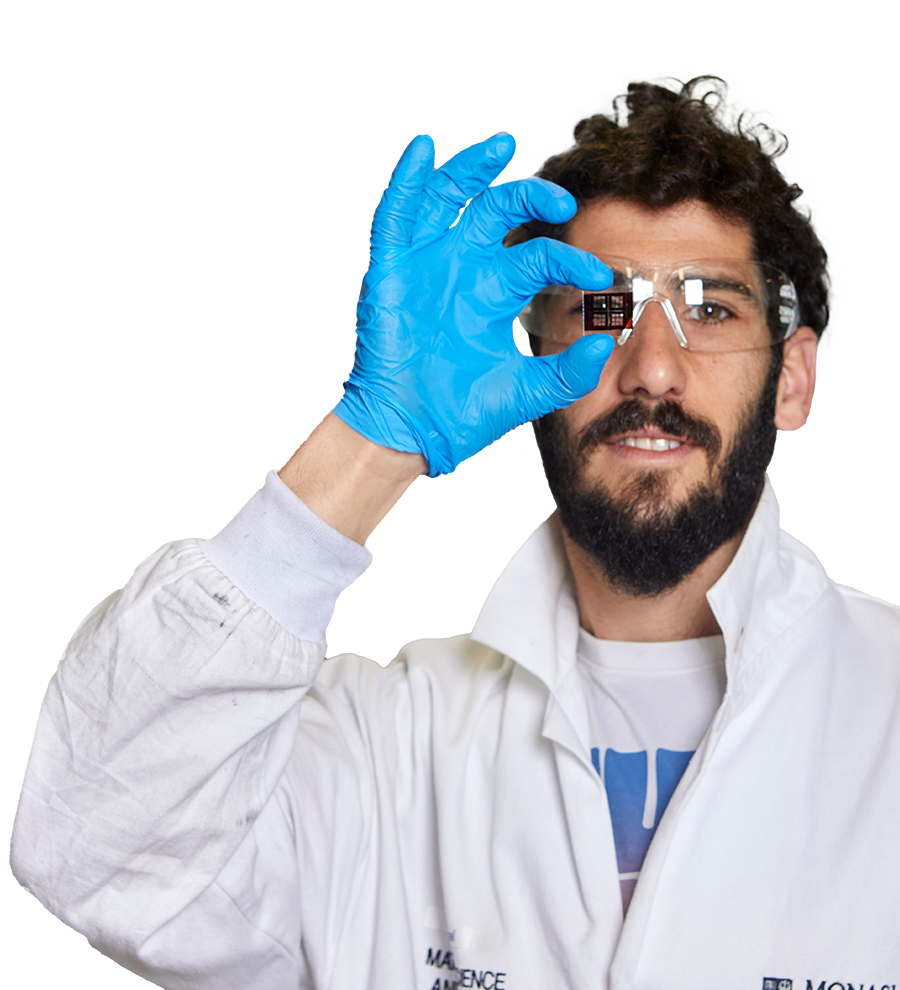Member Profiles
Musician turned scientist Amit Kessel is a rebel with a cause
Inspired by his grandfather, Amit Kessel put a love of music on hold to make a meaningful contribution to renewable energy engineering.
Born in Israel to a family of talented musicians, it would have been easy for the Exciton Science PhD student to explore his artistic and creative talents.
He attended a special music college alongside his ordinary high school, and a precedent had already been set by his uncle, a professional musician living in New York.
But there was another important influence in life. Amit’s grandfather worked as a microbiologist at the Hebrew University of Jerusalem, where they both studied, generations apart.
“I remember when I started my first year, it was basically the same class that he had for his first year, with 50 years difference,” Amit said.
Later, Amit’s grandfather moved to the National Institutes of Health in the United States. And while there was no family pressure to pursue a certain path, an opportunity to honour his grandfather’s career – and meet a Nobel Prize winner in Chemistry – can only have helped to sway him.
“I started music early in life and everyone in my family is a bit of a musician, so maybe there’s a natural inclination,” he said.
“My parents are absolutely not scientists, not at all. But my grandpa is, so maybe it helped a little bit.
“It gives you that little bit of extra inspiration. They made a symposium for him when he was 80, so we all came to America and met his friend Joachim Frank, who had just won the Nobel Prize, and all of these guys who do amazing things. It makes you feel like, ‘okay, let's do something’.”
While the motivation was certainly there, it wasn’t a foregone conclusion that Amit would pursue postgraduate research.
“Once I did my Bachelor’s degree, I was about to finish, and I said, ‘I will never do a Master’s.’ I stuck around, and then in my Master’s, I told everyone, ‘I will never do PhD’, and here am,” he said with a wry smile.
Amit previously studied applied physics, and had to catch up fast in chemistry to study a PhD with Professor Jacek Jasieniak, an Exciton Science Chief Investigator, in the Department of Materials Science and Engineering at Monash University.
Together, the pair share a vision and determination to develop beneficial new devices with genuine impact.
The challenge facing Amit and Jacek is to progress research into ‘solar windows’, a technology that has the potential to replace conventional window glass with transparent, power-generating materials.
“We made some progress, but it's like building a whole structure,” he said.
“You need all the pieces. If you're missing one piece, it's not going to work and you have nothing. So even if you reached very far, and let's say you only miss one piece, it's as if you haven't done anything.
“Maybe I'm a bit exaggerating, but the way I see it, we still have a bit more pieces to fill. When it works, it's going to be really cool. Then we can start thinking ahead about what we are going to doing with it.”
Amit and Jacek are also tackling a challenge common to the development of new photovoltaics technology – scalable production.
“Many research papers you see, they demonstrate a very amazing thing, but on a one-millimetre scale, and if you ask them to make a big one, it's not even possible,” he said.
“I'm trying to ensure from the beginning that whatever I do should be exactly the same process when we want to move to a larger area.
“Once we figure out how to make it at one-inch scale, we're going to try and make it bigger, into something you can actually hold.”
While Jacek’s group is the ideal environment to research perovskite solar cells, studying in Australia is also fulfilling Amit’s desire to broaden his horizons and see the world.
“I love it here,” he said.
“One thing I really like to do is travel, see nature and go running in the mountains. This is really awesome. I see so many beautiful places here and so many beautiful people. It’s really special and I just got started. It's the whole new country and a whole new land.”
We made some progress, but it's like building a whole structure. You need all the pieces. If you're missing one piece, it's not going to work and you have nothing.”

Amit Kessel
PhD student
Monash University